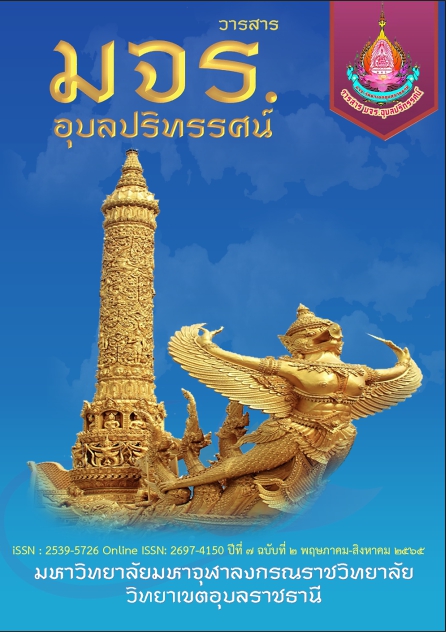THE INFLUENCING FACTORS ON PUBLIC SERVICE QUALITY OF PROVINCIAL ADMINISTRATIVE ORGANIZATIONS IN THE NORTH EASTERN
Main Article Content
Abstract
The objective of this research is to suggest the important component of organizational citizenship behavior and the component of public leadership in which, enhance public service quality of people. The researcher designed and developed 92 item of a questionnaire and collected 296 respondents of the sample from the official staffs of provincial administrative organizations in 8 lower north eastern provinces. The statistical analysis are frequency, percentage, means, standard deviation, correlation analysis and stepwise multi regression analysis. The results present that the means of 3 concepts are high level for all components and related significantly in the same direction moderately and highly at .01. Besides, new public leadership, professional leadership and integrated leadership contributed the coefficient forecast together to public service quality, statistically significant at .05 (r= .76)
Article Details
References
บรรเทา ไชยโคตร. (2559). ความพึงพอใจของประชาชนที่มีต่อการให้บริการสาธารณะ ขององค์การบริหารส่วนตำบลกมลาไสย อำเภอกมลาไสย จังหวัดกาฬสินธุ์, วารสาร มหาวิทยาลัยมหามกุฎราชวิทยาลัย วิทยาเขตร้อยเอ็ด, 5(1), 191-211.
วีระศักดิ์ จินารัตน์ (2564). ระเบียบวธีวิจัยสมัยใหม่ (Modern Research Methodology). อุบลราชธานี: สำนักพิมพ์ยงสวัสดิ์อินเตอร์กรุ๊ป
Acsencio, H. & Mujkic, E. (2016). Leadership behaviors and trust in leaders: Evidence from the U.S. federal government. Public Administration Quarterly, 40(1), 156-179.
Allison, B. J., Voss, R. S., & Dryer, S. (2001). Students classroom and career success: The role of organizational citizenship behavior. Journal of Education for Business, 76(5), 282-288.
Barrow, J.C. (1977). The variables of leadership: A review and conceptual framework. Academy of Management Review, 2(2), 231-251.
DiPaola, M., Tarter, C., & Hoy, W. K. (2005). Measuring organizational citizenship in schools: The OCB Scale. In Wayne K. Hoy & Cecil Misket (Eds.) Leadership and Reform in American Public Schools. Greenwich, CT: Information Age.
Hartley, J. (2018). Ten propositions about public leadership. International Journal of Public Leadership, 14(4), 202-217
Lin, J. S., & Lin, S. C. (2011). Moderating effect of organizational climate on the relationship of organizational support and service-oriented organizational citizenship behavior. African Journal of Business Management, 5(2), 582.
Northouse, P.G. (2016). Leadership: Theory and practice (7th ed.). Los Angeles, CA, US: Sage.
Organ, D.W. (1988). Organizational citizenship behavior: the good soldier syndrome. D.C. Health and Company, Lexington, MA.
Parris, D.L. & Peachey, J.W. (2013). A Systematic literature review of servant leadership theory in organizational contexts. Journal of Business Ethics, 113(3), 377-393.
Parasuraman, A. (1988). The service-quality puzzle. Business Horizons, 31 (5), 35-43
Podsakoff, P. M., Mackenzie, S. B., Paine, J. B., & Bachrach, D. G. (2000). Organizational citizenship behavior: A critical review of the theoretical and empirical literature and suggestions and suggestions for future research. Journal of management, 26(3), 513-563.
Randeree, K. & Chaudhry, A.G. (2012). Leadership style, satisfaction and commitment. Engineering, Construction and Architectural Management, 19(1), 61-85.
Smith, C., Organ, D. W., & Near, J. P. (1983). Organizational citizenship behavior: Its nature and antecedent. Journal of Applied Psychology, 68(4), 653-663.

